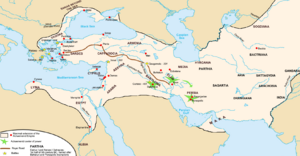Persian couriers facts for kids
Persian couriers were like ancient mail carriers who rode horses very fast. They delivered important messages for the king of Persia during the Achaemenid Empire. These messengers were always ready at special stops along the roads.
What's in a Name?
In ancient Greek, a Persian courier was called ángaros. This word likely came from an older language, meaning something like "agile" or "swift." It's interesting to know that the word "angel" might have come from this same Greek word! An angel is often seen as a messenger, just like these ancient couriers.
How the Couriers Worked
Around 440 BC, a famous Greek historian named Herodotus wrote about the Persian couriers in his book, The Histories. He was amazed at how fast they traveled.
Herodotus explained that the Persians had a clever system. Along the main roads, they set up many stations. At each station, there was a fresh horse and rider ready. The journey was divided into many short parts, with one rider and horse for each part.
The first rider would carry the message as fast as they could to the next station. There, they would pass the message to a new rider on a fresh horse. This was like a relay race! The message would be passed from hand to hand, quickly moving along the whole road.
Herodotus wrote that nothing could stop these messengers. They would keep going at top speed, no matter the weather. Snow, rain, heat, or even the darkness of night did not slow them down. He said their system was like the torch-races the Greeks held, where a flame was passed from one runner to the next. The Persians called this riding post system "Angarum."
You might have heard a famous saying that comes from Herodotus's description. The United States Postal Service uses a similar phrase as a motto on their main Post Office building in New York City. It says: "Neither snow, nor rain, nor heat, nor gloom of night stays these couriers from the swift completion of their appointed rounds." This shows how important and reliable these ancient Persian couriers were!
Related pages
 | Bayard Rustin |
 | Jeannette Carter |
 | Jeremiah A. Brown |


